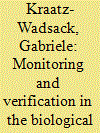| Srl | Item |
| 1 |
ID:
057953


|
|
|
| 2 |
ID:
182968


|
|
|
|
|
| Summary/Abstract |
This article provides a brief overview of the ongoing monitoring and verification (OMV) regime in Iraq in the biological-weapons area. As an integral part of the formal ceasefire arrangement in 1991, the United Nations Security Council established an international verification regime encompassing nuclear, biological, and chemical weapons and some ballistic missiles. The verification regime was built on two mutually supportive pillars. One pillar related to disarmament validation, i.e., verifying that all prohibited weapons, facilities, and related items and certain ballistic missiles in Iraq were destroyed or rendered harmless, and all past weapons-of-mass-destruction (WMD) activities had ceased. The second pillar was ongoing monitoring to continuously verify that non-proscribed activities were not being diverted to reconstitute WMD programs. Biological-weapons disarmament and OMV in Iraq provide an example of an effective system that may serve as a reference point for future efforts.
|
|
|
|
|
|
|
|
|
|
|
|
|
|
|
|
| 3 |
ID:
072883


|
|
|
|
|
| Publication |
2005.
|
| Summary/Abstract |
The Biological Weapons Convention (BWC) regime currently suffers from a lack of effective compliance procedures. Because a legally binding compliance protocol to the BWC is not available, other measures are needed to stabilize the regime against the risk of violations of its rules. The Treaty on the Non-Proliferation of Nuclear Weapons, the Chemical Weapons Convention, and the experiences of UN inspection teams show that among the necessary components of effective compliance mechanisms are an intermediary level between bilateral consultations of states parties and involvement of the UN Security Council as well as independent assessment capabilities. This article suggests that the UN Secretary General could assume such an intermediary function and, using the authority contained in Article 99 of the UN Charter, could investigate not only alleged use of biological weapons but also alleged breaches of the BWC. A standing expert unit in the Department for Disarmament Affairs could provide the independent expertise necessary for such investigations. Such a compliance mechanism could provisionally help stabilize the BWC regime until a permanent compliance system can be agreed.
|
|
|
|
|
|
|
|
|
|
|
|
|
|
|
|